
An In-Depth Study of Section 126 of the Transfer of Property Act: When Gifts May Be Suspended or Revoked
This comprehensive study aims to explore Section 126 in detail, considering its legal implications, interpretations, and practical applications.
An In-Depth Study of Section 126 of the Transfer of Property Act: When Gifts May Be Suspended or Revoked
Introduction
The Transfer of Property Act, 1882, serves as a fundamental statute governing the transfer of property in India. Among its various provisions, Section 126 stands out by addressing the complexities surrounding gifts. Gifts play a significant role in property transactions, and understanding the conditions under which they may be suspended or revoked is crucial for both donors and donees. This comprehensive study aims to explore Section 126 in detail, considering its legal implications, interpretations, and practical applications.
Understanding Section 126: Text and Interpretation
Text of Section 126
Section 126 of the Transfer of Property Act articulates:
"The donor and donee may agree that on the happening of any specified event which does not depend on the will of the donor, a gift shall be suspended or revoked; but a gift which the parties agree shall be revocable wholly or in part at the mere will of the donor is void wholly or in part, as the case may be. A gift may also be revoked in any of the cases (save want or failure of consideration) in which, if it were a contract, it might be rescinded. Save as aforesaid, a gift cannot be revoked. Nothing contained in this section shall be deemed to affect the rights of transferees for consideration without notice."
Breakdown of Key Components
- Agreement Between Donor and Donee: The section emphasizes the need for an explicit agreement between the donor and donee regarding the suspension or revocation of the gift. This agreement must be based on a specified event that is outside the donor’s control.
- Revocation at Will: If a gift is made with the provision that it can be revoked at the mere will of the donor, such a gift is considered void. This establishes that gifts should not be easily retractable without legitimate grounds.
- Rescission Analogies: The provision allows for revocation in situations akin to rescinding a contract. This aligns gift transactions with contractual principles, underscoring the importance of intention and agreement.
- Protection for Third Parties: The section ensures that rights of transferees who acquire property for consideration without notice of revocation remain intact. This safeguards the interests of innocent third parties in property transactions.
Theoretical Underpinnings of Gifts in Law
To understand Section 126, it is vital to delve into the nature and theory of gifts. Legally, a gift is characterized by three essential elements:
- Intention: The donor must have a clear intention to make a gift. This intention is pivotal, as it distinguishes gifts from mere promises or contracts.
- Delivery: For a gift to be valid, there must be a delivery of the subject matter, either actual or symbolic. This act of delivery signifies the donor's relinquishment of control over the property.
- Acceptance: The donee must accept the gift. Acceptance can be express or implied, but it is essential for the validity of the gift.
The Nature of Donor’s Rights
In understanding Section 126, one must also consider the nature of the donor’s rights. The donor retains certain rights until the gift is formally executed, including the right to revoke the gift under specific circumstances. This leads us to the importance of understanding the nuances of revocation as outlined in the section.
Conditions for Suspension or Revocation of Gifts
Specified Events
The section allows for revocation or suspension based on the occurrence of specified events that do not depend on the will of the donor. For instance, a gift may be suspended until a condition is fulfilled, such as the donee reaching a certain age or achieving a milestone. The clarity in defining these events is crucial, as ambiguity can lead to disputes.
Example: Conditional Gifts
Consider a scenario where A gifts a car to B, contingent upon B graduating from college. If B does not graduate, A retains the right to revoke the gift. Here, the specified event (graduation) is beyond A's control, allowing for revocation under Section 126.
Revocation at Will
The provision that allows gifts revocable at the mere will of the donor to be void is essential in ensuring the integrity of gift transactions. It emphasizes that a true gift should involve relinquishment of control, and not be treated as a mere temporary transfer of property.
Implications
This provision protects the donee's interest by preventing arbitrary actions by the donor. A gift should signify a commitment from the donor, and the inability to revoke it at will reinforces this principle.
Analogous Rescission of Contracts
The section’s reference to situations where a gift can be revoked as if it were a contract highlights the interconnectedness of contract and property law. Revocation may occur in cases of misrepresentation, fraud, or lack of consideration, similar to contract rescission.
Example: Fraudulent Gifts
If A gifts property to B under fraudulent pretenses—such as concealing defects in the property—A may revoke the gift based on the principles akin to contract rescission. The protection against fraud is a cornerstone of both property and contract law.
Case Law: Judicial Interpretation of Section 126
Understanding how courts have interpreted Section 126 provides invaluable insights into its application and practical implications.
Case 1: Lachman Dass v. State of Haryana
In this landmark case, the court held that a gift made with specific conditions could be revoked if those conditions were not fulfilled. This ruling underscored the necessity for clarity and the enforceability of terms laid out by the donor.
Case 2: Keshav Chandra v. State of West Bengal
Here, the court dealt with the revocation of a gift based on the failure to meet specified conditions. The decision affirmed that if the conditions for revocation were agreed upon and the specified event occurred, the donor retained the right to reclaim the property.
Case 3: Madan Mohan v. State of Uttar Pradesh
In this ruling, the Supreme Court elaborated on the limits of a donor's rights. It concluded that any attempt to revoke a gift must adhere to the explicitly agreed-upon terms, reinforcing the importance of documentation in gift transactions.
Case 4: Jai Narain v. State of Rajasthan
The court examined the implications of revocation under Section 126, emphasizing that any ambiguity in the donor's intent or the terms of the gift could lead to challenges in enforcing revocation. The judgment highlighted the need for clear documentation of all terms associated with the gift.
Practical Implications of Section 126
For Donors: Strategic Considerations
Donors should consider the implications of Section 126 when making a gift. Clear documentation of any conditions for suspension or revocation is crucial. It is advisable to seek legal guidance when drafting gift agreements to ensure that all terms are legally enforceable.
For Donees: Rights and Protections
Donees must be aware of their rights under Section 126. Understanding the conditions under which a gift can be revoked can help them protect their interests. Seeking clarity on the terms of the gift before acceptance is essential.
Role of Legal Documentation
Proper legal documentation can prevent disputes and misunderstandings. Clear agreements that outline the conditions for revocation, acceptance, and delivery should be drafted and executed to uphold the intent of both parties.
Challenges and Limitations of Section 126
Ambiguity in Terms
One of the primary challenges in applying Section 126 arises from ambiguity in the terms of the gift. Vague or unclear conditions can lead to disputes and legal challenges, undermining the intent of the donor.
Lack of Awareness
There is often a lack of awareness regarding the legal implications of gifts among the general public. This can lead to misunderstandings and disputes, particularly in familial or informal contexts.
Enforcement Difficulties
Even when conditions for revocation are clear, enforcing these rights in practice can be challenging. Legal proceedings can be time-consuming and costly, particularly when the parties involved are unwilling to cooperate.
Conclusion
Section 126 of the Transfer of Property Act is pivotal in governing the conditions under which gifts may be suspended or revoked. By emphasizing the importance of explicit agreements and protecting the rights of both donors and donees, the section serves to enhance the integrity of property transactions.Understanding the nuances of Section 126 is essential for anyone involved in gift transactions. Clarity in documentation, awareness of rights, and an understanding of the legal principles at play can significantly reduce the potential for disputes.As property transactions continue to evolve in India, Section 126 will remain a crucial component of the legal framework governing gifts. Ongoing education and legal guidance will be essential to navigate the complexities inherent in this area of law effectively.
More >>

Jyoti Sharma vs. Vishnu Goyal & Anr. 2025 INSC 1099
This was a long running legal battle between a landlord and her tenants over a shop. The landlord, Jyoti Sharma, wanted her shop back for two main reasons: The tenants had stopped paying rent. She needed the shop to expand her family's business (her bonafide need).
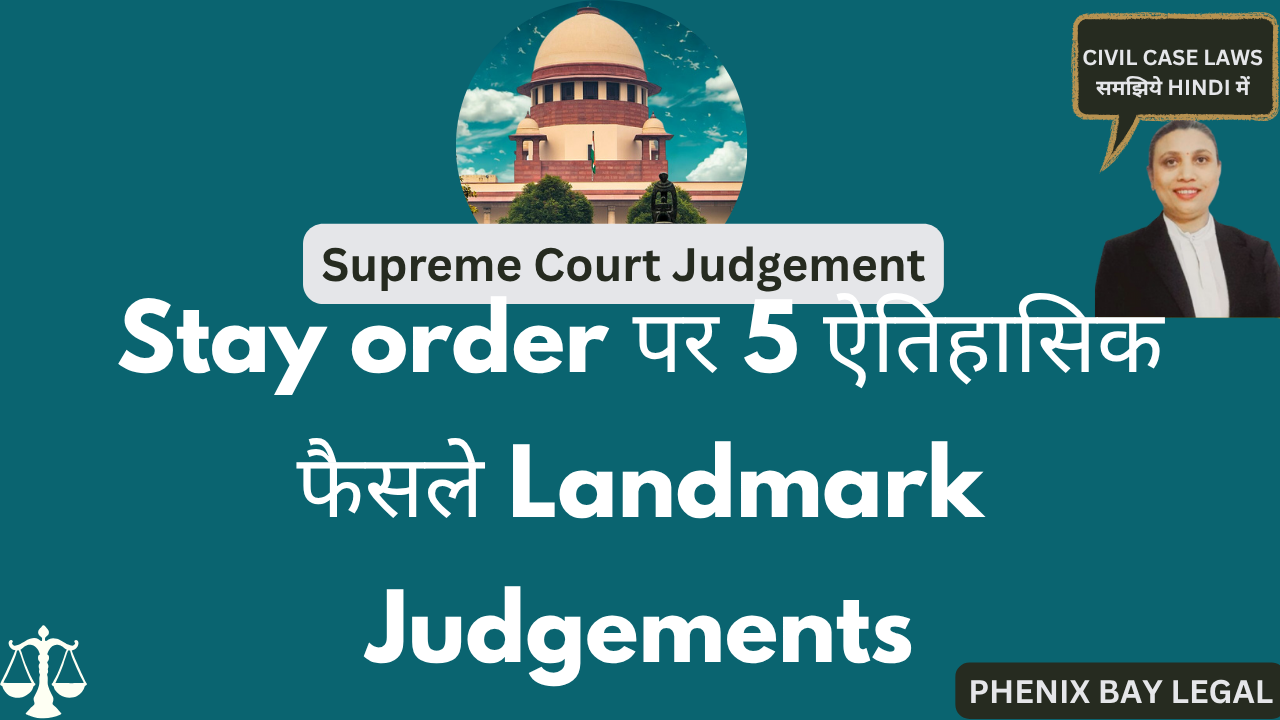
Landmark Judgement on Injunction
In civil, commercial, or even family disputes. But when is a simple injunction suit enough? When do you need to add a declaration of title? And how do courts balance urgency vs evidence in interim relief?
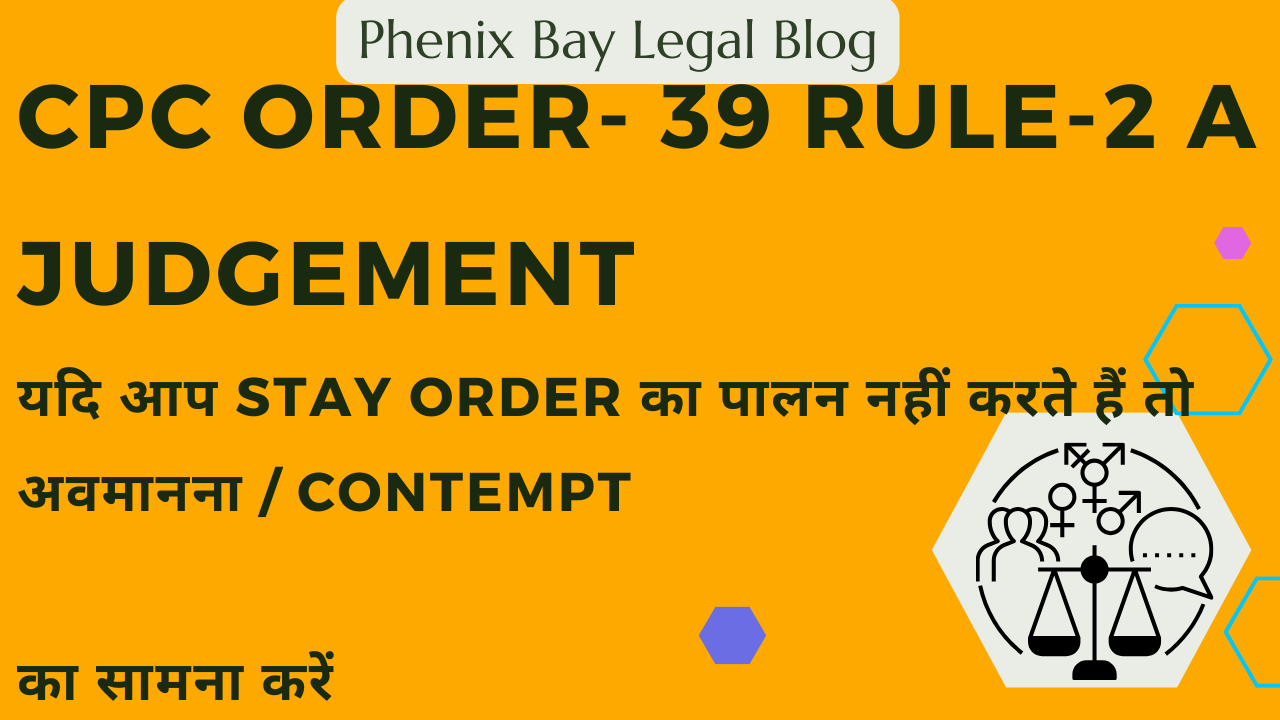
Case Analysis: Stay Order Violation and Contempt of Court by Supreme Court of India
Giving an undertaking to the court is equivalent to an order of injunction—any violation invites contempt proceedings.Injunction orders remain valid until formally vacated by a court—violation before vacation can lead to punishment.
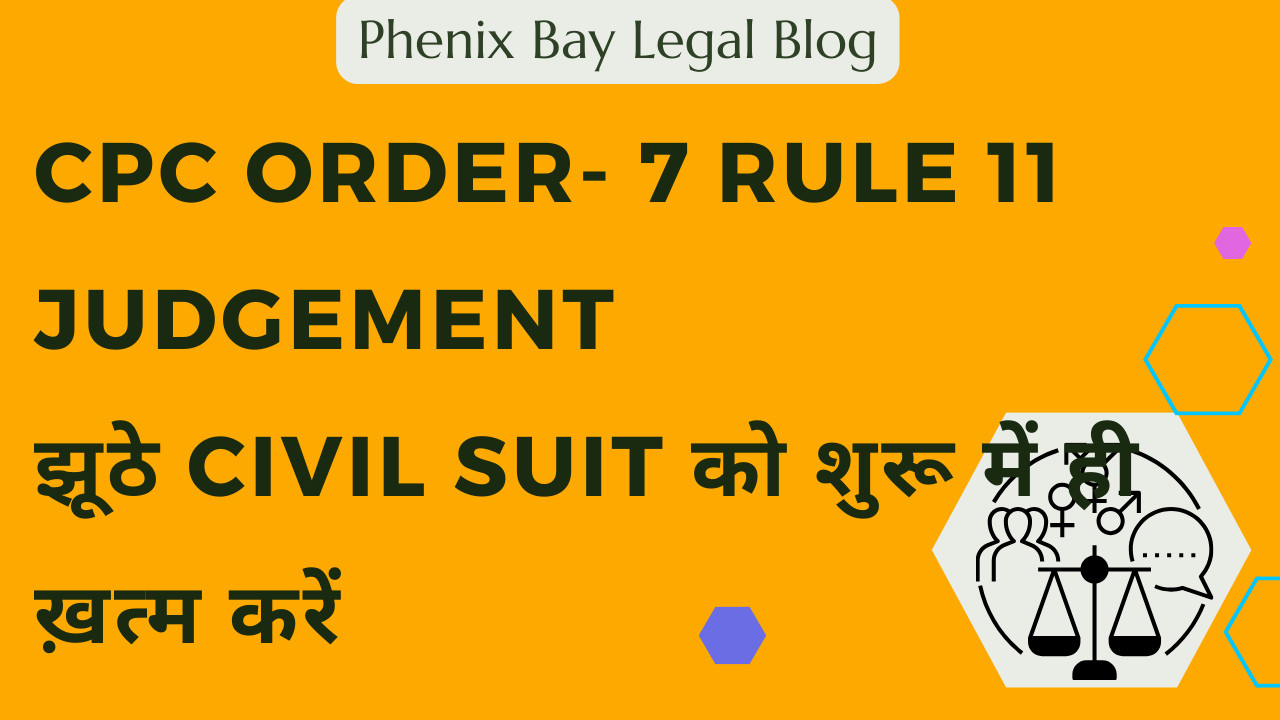
Order 7 Rule 11 of CPC Explanation in Land Mark Judgement
The Sopan Sukhdeo Sable judgment is a landmark ruling that reinforces Order 7 Rule 11 of CPC as a safeguard against frivolous and legally untenable claims. It highlights the importance of examining only the plaint’s contents to decide whether a suit should be dismissed at the threshold.
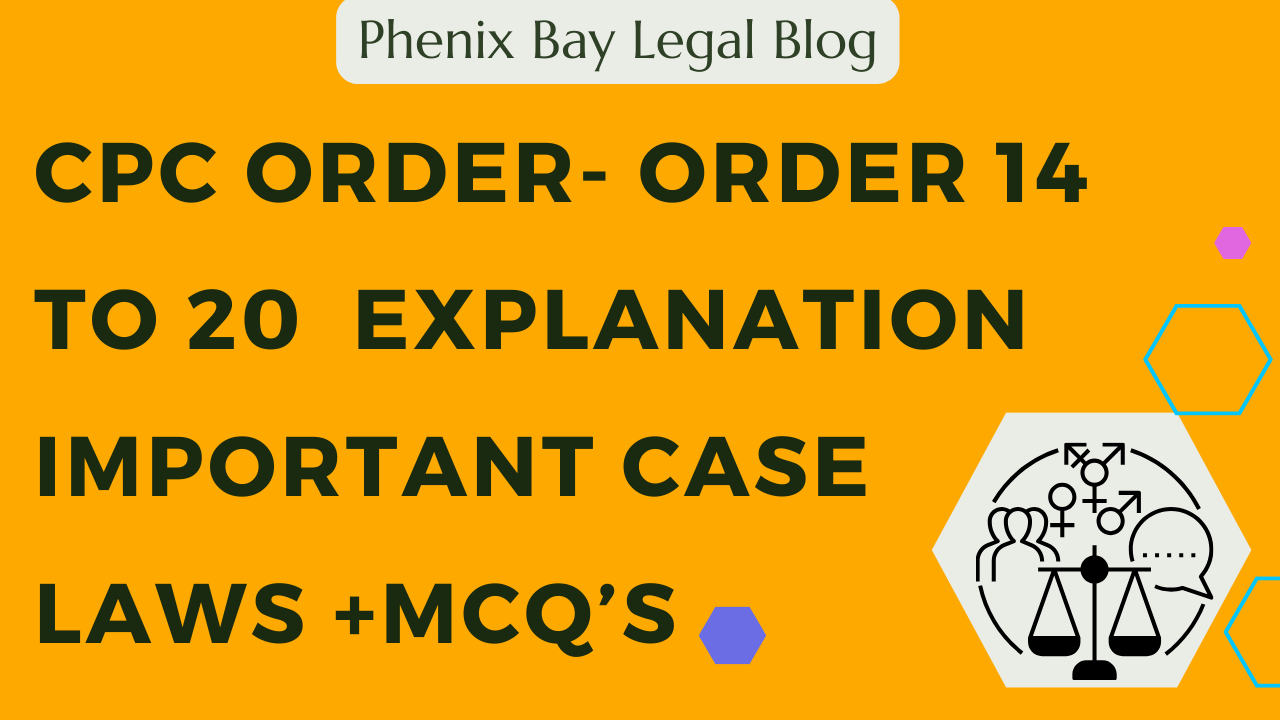
CPC Order- Order 14 to 20 Explanation IMPORTANT CASE LAWS +MCQ’S for Judiciary Exam Preparation
CPC Order- Order 14 to 20 Explanation IMPORTANT CASE LAWS +MCQ’S for Judiciary Exam Preparation
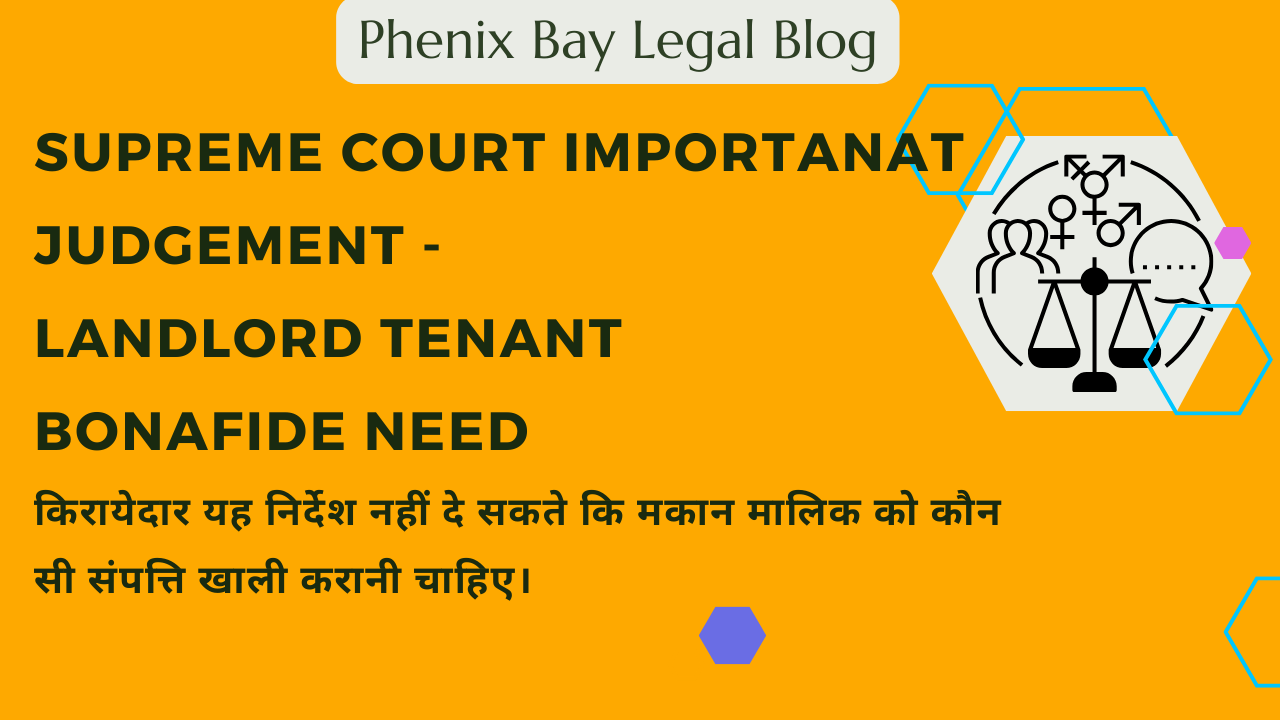
Supreme Court ImportanatJudgement - Landlord Tenant Bonafide need
This case involves a dispute over eviction of a tenant based on the bona fide need of the landlord. The Supreme Court ruled in favor of the landlord, reversing the High Court's decision. Below is a detailed breakdown of the judgment with relevant legal principles, precedents, and reasoning.